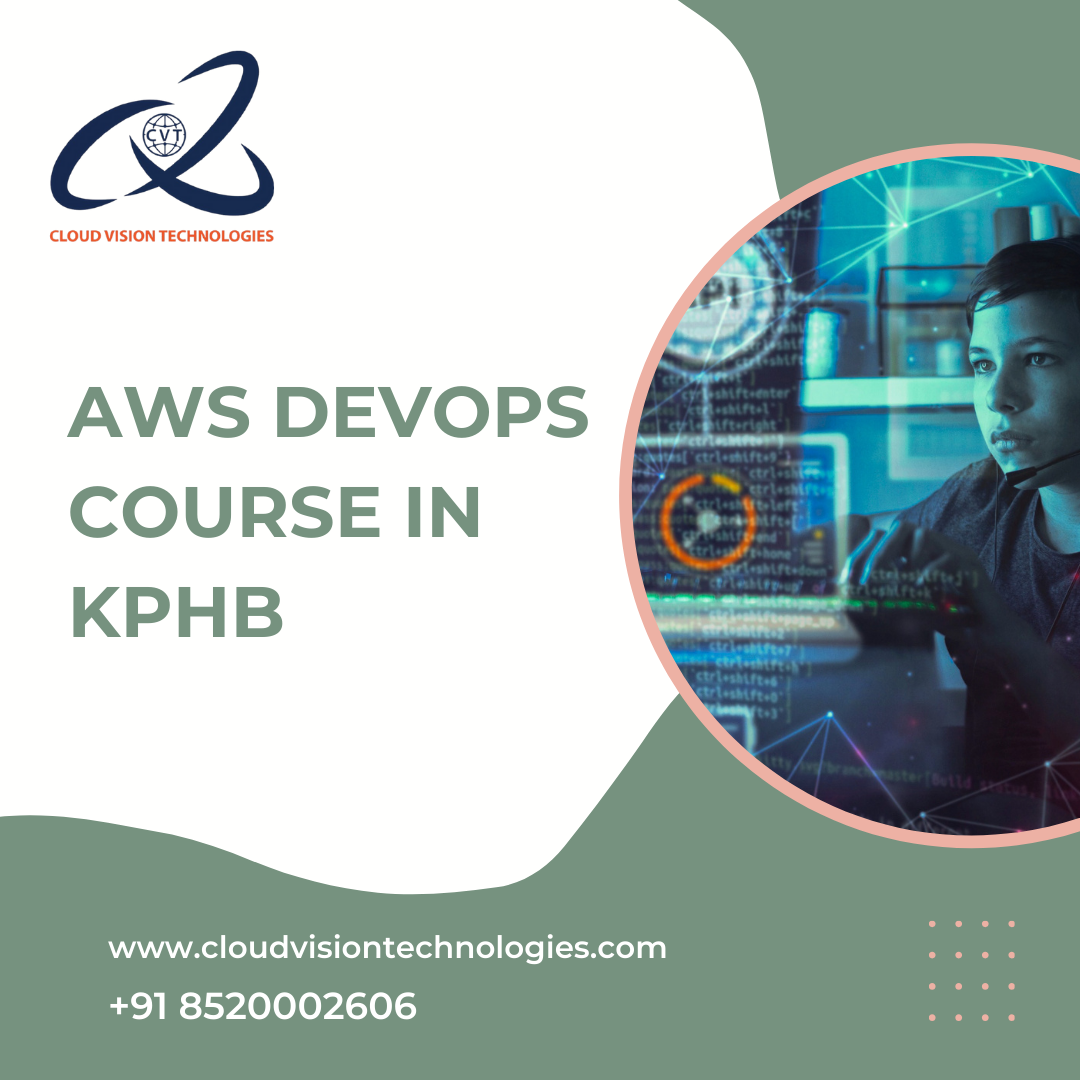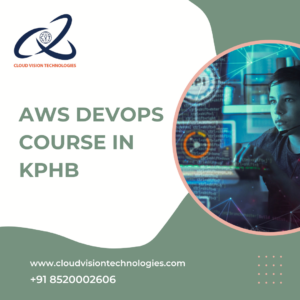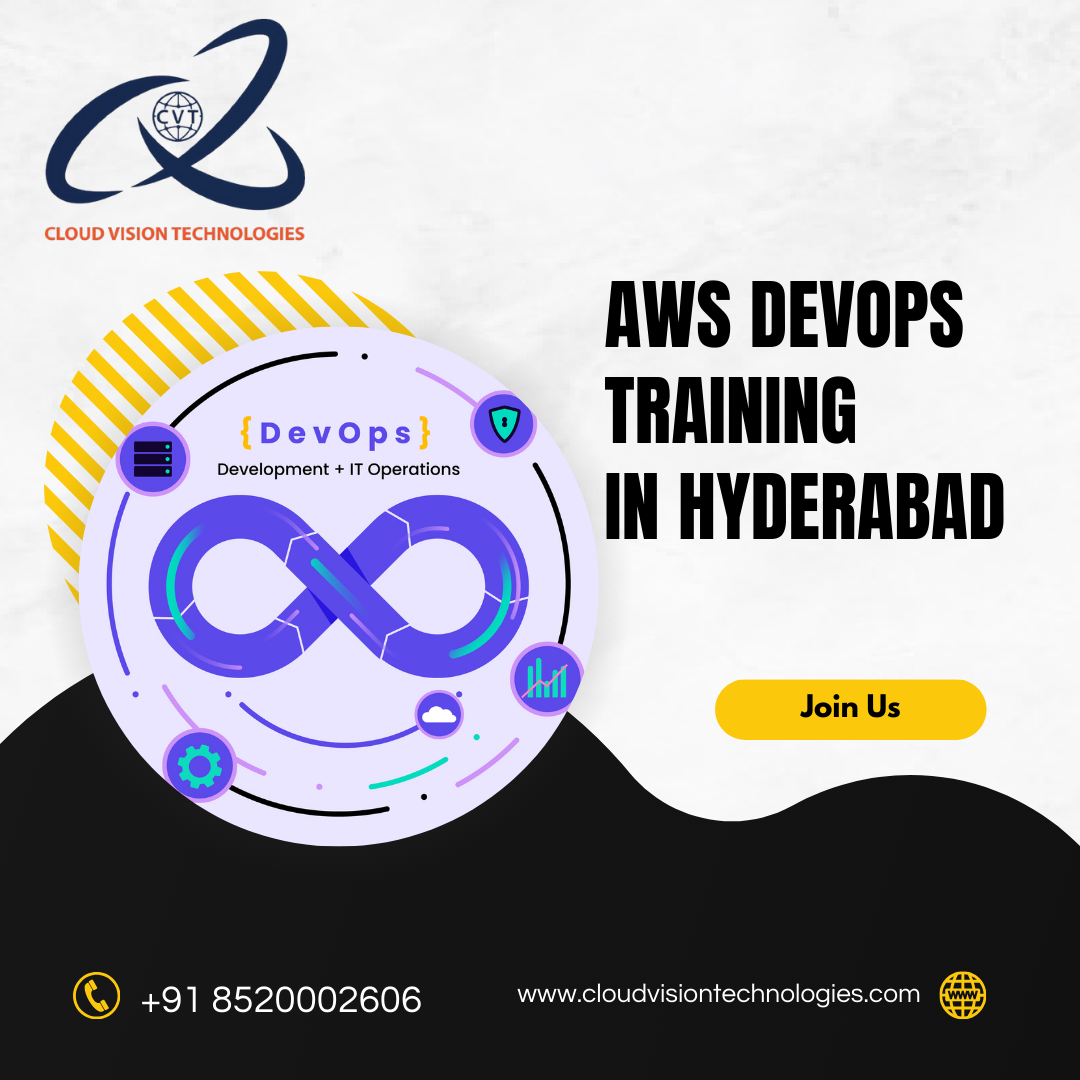
AWS DevOps Course in KPHB
Introduction
AWS DevOps Course in KPHB, In today’s fast-moving tech world, delivering software quickly, reliably, and securely is more important than ever. That’s where DevOps comes in and when combined with the scalability and power of Amazon Web Services (AWS), it becomes a game-changer. Cloud Vision Technologies.
AWS DevOps refers to the practice of using DevOps principles (like continuous integration, continuous delivery, automation, and collaboration) on the AWS cloud platform. This powerful combination allows teams to streamline development processes, reduce manual effort, automate infrastructure, and accelerate software delivery cycles. AWS DevOps Course in KPHB.
When combined with the vast capabilities of Amazon Web Services (AWS), DevOps becomes even more powerful. AWS offers an array of cloud-based tools and services that allow organizations to fully automate their development, testing, deployment, and monitoring processes. This integration, known as AWS DevOps, brings together the agility and automation of DevOps with the scalability and reliability of the AWS cloud platform, offering businesses the ability to scale operations without compromising performance. AWS DevOps Course in KPHB.

What is AWS DevOps?
AWS DevOps is the integration of DevOps practices with Amazon Web Services (AWS) cloud infrastructure. It combines the flexibility and scalability of the AWS cloud with the automation, collaboration, and rapid deployment features of DevOps. The goal is to help development and operations teams work together more effectively and deliver software faster and more reliably. AWS DevOps Course in KPHB
With AWS DevOps, teams can automate software release pipelines, manage infrastructure as code (IaC), monitor system performance, and build highly scalable applications all in one cloud environment. This eliminates manual processes, reduces errors, and enhances collaboration between development, QA, and IT teams. AWS DevOps Course in KPHB
Why Choose AWS for DevOps?
As organizations increasingly move to cloud-based infrastructures, AWS has emerged as a leading choice for implementing DevOps practices. It offers a robust suite of tools and services that streamline the software development lifecycle, from code integration to deployment and monitoring. Below are the key reasons why AWS is the go-to platform for DevOps professionals and teams. AWS DevOps Course in KPHB
Fully Managed Services for Automation
One of the biggest advantages of using AWS for DevOps is its range of fully managed services. Tools like AWS CodePipeline, CodeBuild, CodeDeploy, and Elastic Beanstalk eliminate the complexity of setting up and maintaining CI/CD pipelines from scratch. These services allow developers to automate every stage of software delivery, including code integration, testing, deployment, and infrastructure provisioning. This results in faster development cycles and reduces the chances of human error, enabling teams to focus more on innovation and less on manual tasks. AWS DevOps Course in KPHB
Scalability and Flexibility
Scalability is at the core of AWS architecture, making it ideal for DevOps workflows that demand dynamic resource management. Whether you’re a startup launching a minimum viable product (MVP) or an enterprise managing high-traffic applications, AWS offers services that scale effortlessly. Features like auto-scaling, elastic load balancing, and the ability to deploy across multiple availability zones and regions ensure high availability and performance. AWS allows DevOps teams to respond quickly to changing workloads, ensuring consistent performance and cost optimization. AWS DevOps Course in KPHB
Security and Compliance at Every Level
Security is a top priority for any DevOps pipeline, and AWS provides a highly secure environment backed by industry standards and certifications. With services like AWS Identity and Access Management (IAM), Key Management Service (KMS), CloudTrail, and AWS Shield, organizations can control user access, encrypt data, and protect infrastructure against threats. Additionally, AWS complies with global security standards such as GDPR, HIPAA, ISO 27001, and SOC 2, making it easier for companies to meet regulatory requirements while maintaining DevOps agility. AWS DevOps Course in KPHB
Seamless Integration with Popular DevOps Tools
A DevOps workflow is only as good as its integrations, and AWS excels at supporting a wide range of third-party tools. AWS services seamlessly integrate with tools like GitHub, GitLab, Bitbucket, Jenkins, Docker, Kubernetes, Terraform, Ansible, and more. This interoperability enables teams to continue using their preferred development, testing, and deployment tools while leveraging AWS infrastructure. It also allows for hybrid deployments, making AWS a flexible choice for organizations transitioning to the cloud or operating in multi-cloud environments. AWS DevOps Course in KPHB
Core AWS DevOps Tools and Services
AWS provides a powerful suite of tools designed to support and streamline the DevOps lifecycle. These services help with continuous integration, continuous delivery, infrastructure automation, container orchestration, and performance monitoring all essential for modern software development. Below is a breakdown of the most commonly used AWS DevOps tools and how they contribute to an efficient DevOps workflow. AWS DevOps Course in KPHB.
AWS CodePipeline – Automate the CI/CD Process
AWS CodePipeline is a fully managed continuous integration and continuous delivery (CI/CD) service that automates the entire software release process. It enables developers to model, visualize, and automate the steps required to release software updates, from code commit to production deployment. By integrating with tools like GitHub, Jenkins, and AWS CodeBuild, CodePipeline ensures that every code change is automatically built, tested, and deployed, improving both speed and consistency. AWS DevOps Course in KPHB
AWS CodeBuild – Scalable Build Automation
AWS CodeBuild is a highly scalable build service that compiles source code, runs unit tests, and generates deployment-ready packages. Unlike traditional build servers, CodeBuild scales automatically based on the size and number of builds, which means there’s no need to manage or provision build servers manually. It integrates easily with CodePipeline, making it a seamless choice for automating the build phase in your DevOps lifecycle. AWS DevOps Course in KPHB.

AWS CodeDeploy – Streamlined Code Deployment
AWS CodeDeploy automates code deployments across various compute services, including Amazon EC2, Lambda, ECS, and even on-premise servers. It supports both in-place and blue/green deployments, minimizing downtime and reducing the risk of deployment errors. CodeDeploy helps maintain high availability and enables features like automatic rollback in case of failure, ensuring smooth and reliable software releases. AWS DevOps Course in KPHB
Amazon ECR (Elastic Container Registry) – Docker Image Management
Amazon ECR is a fully managed container image registry that simplifies the storage, management, and deployment of Docker container images. It integrates seamlessly with Amazon ECS and EKS, making it easier for DevOps teams to use containers in their development and production environments. ECR provides high availability, image vulnerability scanning, and tight access control, making it a secure and efficient option for containerized DevOps workflows. AWS DevOps Course in KPHB.
Amazon ECS & Amazon EKS – Container Orchestration Services
Amazon ECS (Elastic Container Service) is AWS’s native container orchestration service, while Amazon EKS (Elastic Kubernetes Service) brings the power of Kubernetes to AWS. Both services help manage the deployment, scaling, and operation of containerized applications. ECS is ideal for teams looking for simplicity and tight AWS integration, while EKS is suitable for those who prefer Kubernetes’s ecosystem and multi-cloud portability. These services provide automated scaling, load balancing, and service discovery, making container orchestration seamless. AWS DevOps Course in KPHB.
AWS CloudFormation – Infrastructure as Code (IaC)
AWS CloudFormation allows DevOps teams to define and manage infrastructure as code (IaC) using declarative templates written in JSON or YAML.This enables version control, automation, and consistent environment provisioning. CloudFormation integrates with other AWS services, allowing for the deployment of complex infrastructure stacks with a single click or command. It’s essential for automating infrastructure deployment, reducing configuration drift, and improving efficiency in cloud environments. AWS DevOps Course in KPHB.
Amazon CloudWatch – Monitoring and Observability
Amazon CloudWatch provides real-time monitoring and observability for AWS resources and applications. It collects logs, metrics, and events from various AWS services and enables automatic alarms, dashboards, and anomaly detection. DevOps teams use CloudWatch to gain insights into system performance, troubleshoot issues quickly, and maintain application health. With CloudWatch, you can ensure that your application remains reliable and optimized at all times. AWS DevOps Course in KPHB
Benefits of Using AWS DevOps
Adopting AWS DevOps offers a wide range of benefits that help businesses streamline their development processes, improve efficiency, and deliver high-quality software faster. Whether you’re a startup or an enterprise, AWS DevOps provides a scalable and reliable framework for modern application development. Below are some of the most impactful benefits:
Faster Software Delivery
One of the most significant advantages of AWS DevOps is the acceleration of the software development lifecycle. With fully managed CI/CD tools like AWS CodePipeline, CodeBuild, and CodeDeploy, teams can automate builds, tests, and deployments. This leads to rapid and reliable software releases with fewer manual steps. As a result, businesses can quickly roll out new features, updates, and bug fixes, gaining a competitive edge in the market.
Lower Operational Costs
AWS follows a pay-as-you-go pricing model, which means you only pay for the resources you use. Combined with features like auto-scaling and on-demand provisioning, this significantly reduces operational costs. AWS DevOps eliminates the need for expensive, on-premises hardware and lowers maintenance overhead by automating infrastructure and resource management. This makes it a cost-effective solution for companies of all sizes. AWS DevOps Course in KPHB.
Automation and Consistency
DevOps is all about automation, and AWS takes it to the next level. With tools like AWS CloudFormation and Terraform, you can define your infrastructure as code (IaC), ensuring repeatable, consistent, and error-free deployments across multiple environments. Automated workflows help eliminate manual interventions, reduce the risk of configuration drift, and maintain uniformity in development, staging, and production environments. AWS DevOps Course in KPHB.
Improved Monitoring and Troubleshooting
With AWS DevOps, visibility into your application and infrastructure is greatly enhanced through tools like Amazon CloudWatch, AWS X-Ray, and AWS CloudTrail. These services provide real-time monitoring, logging, and distributed tracing, enabling quick detection and resolution of issues. Detailed metrics and dashboards help teams optimize performance, identify bottlenecks, and maintain high system reliability. AWS DevOps Course in KPHB.
Enhanced Collaboration Between Teams
AWS DevOps promotes a collaborative culture between development and operations teams. Shared access to tools, centralized dashboards, and automated feedback loops help break down traditional silos. Developers, testers, and operations engineers can work together in real-time, enabling continuous feedback and faster iterations. This alignment not only improves productivity but also enhances overall product quality and user satisfaction.

Career Scope in AWS DevOps
As of 2025, the demand for skilled AWS DevOps professionals continues to grow rapidly across industries. With businesses accelerating digital transformation and moving their infrastructure to the cloud, the role of DevOps engineers has become more critical than ever. Professionals who can manage cloud infrastructure, automate deployments, and ensure continuous integration and delivery are highly sought-after in today’s job market.
DevOps Engineer
The most common and in-demand role is that of a DevOps Engineer. In this role, you’re responsible for implementing CI/CD pipelines, automating deployments, managing infrastructure using tools like CloudFormation or Terraform, and ensuring application reliability. Proficiency in AWS services like CodePipeline, CodeBuild, ECS, and CloudWatch is a huge plus. DevOps Engineers often act as the bridge between development and operations teams, ensuring seamless delivery and faster time to market. AWS DevOps Course in KPHB.
AWS Cloud Engineer
As an AWS Cloud Engineer, your focus will be on building and maintaining cloud infrastructure using AWS services. While DevOps principles still apply, this role leans more toward cloud architecture, networking, and storage solutions. You’ll be expected to configure services like EC2, S3, VPC, IAM, RDS, and integrate them with DevOps tools. This is a great role for those who want to specialize in AWS infrastructure while still working with automation and deployment tools. AWS DevOps Course in KPHB.
Site Reliability Engineer (SRE)
Site Reliability Engineers (SREs) focus on ensuring the availability, scalability, and performance of applications in production environments. SREs often use AWS DevOps tools for monitoring, logging, alerting, and handling incidents efficiently. In this role, you’ll implement best practices for uptime, automate operational tasks, and maintain SLAs (Service Level Agreements). It’s a hybrid role that combines software engineering with operations ideal for those who enjoy problem-solving and performance optimization.
CI/CD Pipeline Specialist
A CI/CD Pipeline Specialist focuses on creating robust and secure pipelines that automate the software delivery process. This role requires deep expertise in tools like AWS CodePipeline, Jenkins, GitHub Actions, and other third-party integrations. The goal is to ensure that code is built, tested, and deployed reliably with minimal human intervention. As organizations prioritize faster and safer deployments, this role has become crucial to achieving continuous delivery. AWS DevOps Course in KPHB.
Infrastructure Automation Engineer
Infrastructure Automation Engineers are responsible for managing cloud infrastructure through code. They specialize in Infrastructure as Code (IaC) tools such as AWS CloudFormation, Terraform, and Ansible. These professionals help automate provisioning, scaling, and configuration of resources, making deployments more consistent and efficient. This role is perfect for those who enjoy scripting and automating repetitive tasks to enhance infrastructure reliability and performance. AWS DevOps Course in KPHB.
A Promising Future
With the continued rise of cloud-native applications, microservices, and containerization, AWS DevOps offers long-term career growth. Organizations are increasingly looking for professionals who can optimize workflows, increase deployment frequency, and maintain application stability. Whether you’re just starting out or looking to upskill, a career in AWS DevOps opens doors to exciting and high-paying job opportunities around the globe.
AWS DevOps Course in KPHB
Are you located in KPHB, Hyderabad, and looking to build a career in AWS DevOps? You’re in the right place! With the growing demand for cloud and DevOps professionals, enrolling in an AWS DevOps course in KPHB can be your gateway to a high-paying tech career. Whether you’re a fresher, a student, or a working professional, local institutes in KPHB offer hands-on training to help you master AWS tools and DevOps practices from the ground up.
A typical AWS DevOps training course in KPHB covers both foundational AWS services and core DevOps tools. You’ll learn how to launch and manage EC2 instances, use S3 buckets for storage, configure IAM roles for secure access, and set up VPCs for networking. On the DevOps side, you’ll master tools like Git, Jenkins, Docker, Kubernetes, Terraform, and Ansible. You’ll also dive into AWS-specific DevOps services like CodePipeline, CodeDeploy, CodeBuild, CloudWatch, and CloudFormation enabling you to automate deployments, manage infrastructure as code, and monitor your applications effectively. AWS DevOps Course in KPHB.
After completing an AWS DevOps course in KPHB, you can apply for roles such as DevOps Engineer, AWS Cloud Engineer, Site Reliability Engineer (SRE), CI/CD Specialist, and Infrastructure Automation Engineer. These roles are in high demand across sectors like IT services, finance, healthcare, and e-commerce. With the right training and a certification, you can significantly improve your chances of landing interviews and growing your career in cloud computing. AWS DevOps Course in KPHB.

Conclusion
In today’s fast-paced tech landscape, AWS DevOps has emerged as a powerful combination that transforms how applications are developed, deployed, and managed. By merging the automation and efficiency of DevOps practices with the scalability, security, and flexibility of AWS cloud services, teams can deliver better software faster and more reliably. From continuous integration and delivery (CI/CD) to infrastructure automation and real-time monitoring, AWS DevOps enables organizations to stay competitive and agile. AWS DevOps Course in KPHB.
Whether you’re a student just starting your career or an experienced IT professional aiming to stay ahead in the industry, learning AWS DevOps equips you with in-demand, future-proof skills. It not only enhances your technical proficiency but also improves your understanding of modern software development workflows, cloud environments, and automation strategies. With businesses across the globe adopting cloud-first and DevOps-first approaches, the career opportunities in AWS DevOps are booming ranging from DevOps Engineers and Cloud Architects to SREs and Infrastructure Automation Specialists. AWS DevOps Course in KPHB.
Address: Cloud Vision Technologies
Location: Samhitha Enclave, 3rd floor, KPHB Phase 9, Kukatpally, Hyderabad, Telangana – 500072
Contact Number : +91 8520002606
Mail ID: info@cloudvisiontechnologies.com
Website: https://www.cloudvisiontechnologies.com





